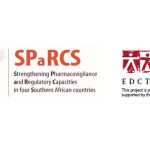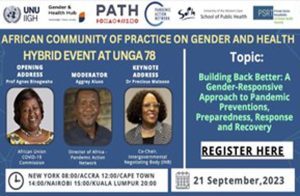
Gender-transformative research in Africa: collective learning and synthesis to improve sexual reproductive and maternal health rights and services
16 November 2022
SPaRCS Launches CHW Training Materials on Adverse Drug Reaction Reporting
18 October 2023*indicates student or postdoctoral fellow
- Asha George
- Lwazi Manzi
- Johanna Riha
- Woldekidan Amde
- *Tima Zgambo

African Regional Community of Practice for Gender and Health
The African Regional Community of Practice (CoP) for Gender and Health in Africa was formed to facilitate a space in which the African community can engage in greater discussions and share ideas on matters of Gender and Health, especially after the Covid-19 global pandemic. It aims to advance African initiatives that facilitate regional understanding, collaboration, and policy-relevant knowledge production and practice on gender and health.
Project Summary
Various African organisations focus on advancing gender equality in health through designing policies, implementing programmes, teaching, research and advocacy. However, stakeholders across different constituencies, geographies and language groups, are not well connected. There also appears to be limited documentation on what works best (for Africa) in integrating gender perspectives into government health programmes as well as the transformative element of gender and health programming. Thus, the main objectives of the CoP are;
- To advance collective learning and action on gender and health from an African regional perspective
- To advance the decolonisation of global health, and of gender and health, in particular, and support Africanized initiatives that facilitate regional understanding, collaboration and policy-relevant knowledge production
Community members will include programme implementers, policymakers, advocacy groups, international and local organisations, academicians, researchers and students. The community will engage in collaborative learning and action across various online spaces to advance the above agenda across the continent.
The benefit of this CoP is that it will provide a platform for information sharing, dialogue, and relationship building to advance collective learning and action on gender and health across the African continent.
The launch of the community of practice was on 8 June, 2023 at 08:00 SAST.
Co-founders
- The African Union Commission on COVID-19 Gender and Stigmatisation Working Group
- United Nations University International Institute for Global Health (UNU-IIGH) – Gender and Health Hub- https://iigh.unu.edu/about/unu-iigh/pillar-two/gender-health-hub
- School of Public Health, University of the Western Cape – https://soph.uwc.ac.za/
Collaborators:
- PATH – https://www.path.org/solutions/primary-health-care/
- Pandemic Action Network (PAN) – https://www.pandemicactionnetwork.org/
- Private Sector Roundtable on Global Health Security – https://www.globalhealthsecurity.net/
- Africa BIO – https://www.africabio.com/
- School of Public Health, University of the Western Cape – https://soph.uwc.ac.za/
Webinars:
Launch of the GT4Africa journal supplement
31 July 2025
Lancement du supplément GT4Africa
31 July 2025
Gendered Workplace Violence in the PHC Workforce
PART 2
5 December 2024
What does a Gender-Just Climate Transition Mean for Health Systems in Africa?
23 October 2024
Addressing Technology-Facilitated Gender-Based Violence to Safeguard Digital Spaces
Webinar 7
28 August 2024
Gendered Workplace Violence in the PHC Workforce – Policy Frameworks for Action
PART 1
3 July 2024
Reflections on Gender Equality and Health in the Time of Polycrises
Webinar 6
7 December 2023
Gender-Responsive Pandemic Preparedness
Webinar 4
17 August 2023
Funding for gender and health in Africa
Webinar 3
13 July 2023
Launch of the Community of Practice on Gender and Health in Africa at Africa Health ExCon
Webinar 2
8 June 2023
Initial consultation meeting on Gender Equality and Health in Africa
Webinar 1
December 2022
Publications
Editorial
- No pandemic preparedness and research without gender equalityJocalyn Clark, Asha George and Rajat Khosla introduce The BMJ Collection on sex differences and gender equality priorities for pandemic response
- Invest in youth led efforts for gender equality and pandemic preparedness
Young leaders are critical for research, programme design, and advocacy, say Merette Khalil, Cyubahiro Karangwa Verite, and Shakira Choonara
Analysis
- Acting on sex and gender in medical innovation is good for business
Lavanya Vijayasingham and colleagues argue that as well as improving safety and efficacy, considering sex and gender related factors in medical research can have commercial benefits. - African governments must build on covid-19 responses and invest further in advancing and sustaining gender equality
Kéfilath Bello and colleagues argue that developing sustainable strategies to increase gender equality will help African countries respond to future crises. - Using an intersectionality approach to transform health services for overlooked healthcare users and workers after covid-19
Intersectional analysis and action are needed in future pandemics to ensure more inclusive health services, say Mamothena Mothupi and colleagues.
Research
- A shared agenda for gender and covid-19 research: priorities based on broadening engagement in science.
Asha George and colleagues lay out a research agenda on sex differences and gender equality priorities to advance gender justice across health and social policy and programmes.
The collection was developed in partnership with the United Nations University International Institute for Global Health and the School of Public Health at the University of the Western Cape. The BMJ commissioned, peer reviewed, edited, and made the decision to publish these articles. Article handling fees were funded by the Bill & Melinda Gates Foundation. The lead editors were Rachael Hinton, Paul Simpson, and Jocalyn Clark for The BMJ.

